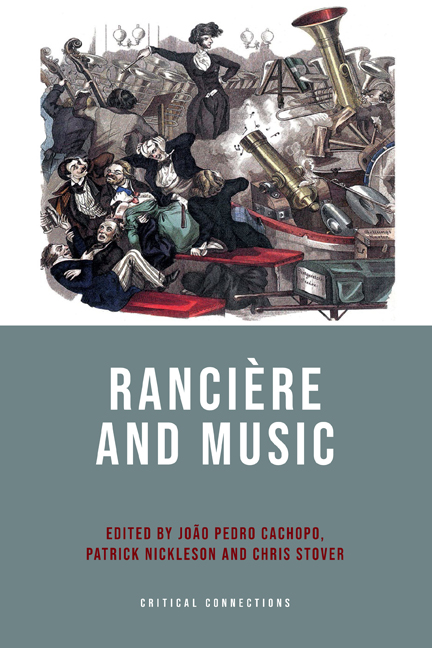Book contents
- Frontmatter
- Contents
- List of Examples
- Acknowledgements
- Notes on Contributors
- Introduction
- Part I: Music and Noise
- 1 Musique concrète and the Aesthetic Regime of Art
- 2 ‘Rip it up and start again’: Reconfigurations of the Audible under the Aesthetic Regime of the Arts
- 3 A Lesson in Low Music
- Part II: Politics of History
- 4 Wandering with Rancière: Sound and Structure under the Aesthetic Regime
- 5 Staging Music in the Aesthetic Regime of Art: Rancière, Berlioz and the Bells of Harold en Italie
- 6 Rancière on Music, Rancière’s Non-music
- 7 Coloured Opera and the Violence of Dis-identification
- Part III: Politics of Interaction
- 8 Musical Politics in the Cuban Police Order
- 9 Rancière and Improvisation: Reading Contingency in Music and Politics
- 10 Rancière’s Affective Impropriety
- Part IV: Encounters and Challenges
- 11 Rancière, Resistance and the Problem of Commemorative Art: Music Displacing Violence Displacing Music
- 12 Stain
- 13 On Shoemakers and Related Matters: Rancière and Badiou on Richard Wagner
- 14 Roll Over the Musical Boundaries: A Few Milestones for the Implementation of an Equal Method in Musicology
- Afterword
- A Distant Sound
- Works Cited
- Index
8 - Musical Politics in the Cuban Police Order
Published online by Cambridge University Press: 03 October 2020
- Frontmatter
- Contents
- List of Examples
- Acknowledgements
- Notes on Contributors
- Introduction
- Part I: Music and Noise
- 1 Musique concrète and the Aesthetic Regime of Art
- 2 ‘Rip it up and start again’: Reconfigurations of the Audible under the Aesthetic Regime of the Arts
- 3 A Lesson in Low Music
- Part II: Politics of History
- 4 Wandering with Rancière: Sound and Structure under the Aesthetic Regime
- 5 Staging Music in the Aesthetic Regime of Art: Rancière, Berlioz and the Bells of Harold en Italie
- 6 Rancière on Music, Rancière’s Non-music
- 7 Coloured Opera and the Violence of Dis-identification
- Part III: Politics of Interaction
- 8 Musical Politics in the Cuban Police Order
- 9 Rancière and Improvisation: Reading Contingency in Music and Politics
- 10 Rancière’s Affective Impropriety
- Part IV: Encounters and Challenges
- 11 Rancière, Resistance and the Problem of Commemorative Art: Music Displacing Violence Displacing Music
- 12 Stain
- 13 On Shoemakers and Related Matters: Rancière and Badiou on Richard Wagner
- 14 Roll Over the Musical Boundaries: A Few Milestones for the Implementation of an Equal Method in Musicology
- Afterword
- A Distant Sound
- Works Cited
- Index
Summary
This chapter explores how Cuban popular dance music nurtures and contests revolutionary values in today's Cuba. I focus on the performance and discursive construction of the song ‘Cubanos por el mundo’ by Interactivo, one of Cuba's most popular bands in the last decade, using a combination of textual and musical analysis framed by Jacques Rancière's notion of ‘police’ and ‘politics’. From this perspective I analyse the formation of a ‘Cuban police order’ structured around a shared notion of the revolutionary and discuss how the experience of the song dialogues musically with that order by associating it with pleasure and critique. Empirically, I focus on the recording and an improvisation by Roberto Carcassés, the director of the band and composer of the song, during a live performance at a massive concert held to celebrate revolutionary unity at Plaza Anti-Imperialista in Havana. The second part of the chapter discusses how the song nurtured new articulations of ‘politics’ and ‘police’ discursively by studying blogs and newspaper articles written in response to the improvisation.
Listening to the pleasures and politics of Cuban grooves through Rancière's two concepts call for a relational understanding of the politics of music that examines both the broader police orders within which music makes sense and, through in-depth listening, how music disputes and amplifies such orders. It suggests that the multidimensional meanings of music in experience allow sounds to both pleasurise and criticise police orders as rhythms, melodies and sung statements interlock in time. More importantly, the study shows how these relationships create pleasurable ways of being together that both reproduce and change ‘what is common to the community’. It resonates with John Street's emphasis on ‘the political possibilities inherent in [musical] pleasure’ and calls into question studies that focus exclusively on lyrics and music’s circulation to capture the politics of music. A relational understanding of the politics of music grants more political agency to musical sounds than most existing studies while still considering music's discursive context.
‘Police’ and ‘politics’ in Cuban grooves
Rancière's ‘police’ has nothing to do with common understandings of police officers. Instead, it refers to a way of making sense of sense perceptions that shape what is common in a community by delegating different subjects to specific positions in a hierarchy.
- Type
- Chapter
- Information
- Ranciere and Music , pp. 177 - 206Publisher: Edinburgh University PressPrint publication year: 2020



